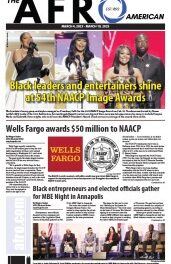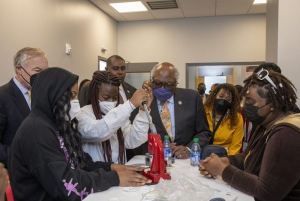 By Lola Akinlapa
By Lola Akinlapa
On June 5, 2020, nearly 10,000 protestors took to the streets of Rhode Island in the wake of the racial inequality plague destroying Black and Brown communities. In recent years, the sensationalized coverage of police brutality, social and racial equity movement, coupled with the unequal impact of the COVID-19 crisis in Rhode Island and the United States has gained local, national and international momentum. This has forced many small businesses, private, public and government entities to reassess the systemic and structural racism that denies and eliminates opportunities for communities of color to experience a higher sense of economic mobility as it relates to workplace participation. Many businesses have begun to prioritize diversity, inclusion and equity (DEI) to encourage a more positive culture that supports fair and sustainable opportunities for everyone to succeed and grow personally and professionally. However, who does that really include? Individuals are complex and are more than just the color of their skin or gender. This is extremely critical to understand when implementing Diversity, Equity, and Inclusion in the workplace. The Rhode Island Foundation has allocated $8.5 million dollars to support efforts focused on diversity, equity, access, and inclusion. The Rhode Island State Office of Diversity, Equity, and Opportunity instead to use this money to focus on, “developing recruitment and retention activities to promote diversity, and ensuring compliance with the federal and state laws and regulations.”
Unfortunately, Diversity, Inclusion, and Equity are not synonymous nor as comprehensive as they should be. While the idea behind organizing and implementing DEI practices is valuable and ethical, when DEI practices are not implemented with care and consideration, they can have adverse effects on a company that can negatively impact a company’s culture, driving a wedge between employees within their existing workforce. As it stands now, the current concept of DEI is incomplete as this can leave out individuals with multiple intersecting identities marginalized. As a Nigerian-American woman, I have experienced first-hand the impact of race and gender on my employment status. I have also witnessed its impact on other marginalized groups such as persons with disabilities, who also identify as members of other marginalized groups, due to my work in disability employment services.
From a broader look, African Americans systematically experience higher unemployment rates, fewer job opportunities, lower pay, poorer benefits and greater job instability. When females are employed, they tend to work lower quality jobs in less than adequate work conditions with little improvement or room for further career growth. Persons with disabilities, whether physical, mental, cognitive, and also depending on the severity of their disability, tend to experience lack of accessible, affordable transportation and housing and lack of supports and needed services in places of employment. This is supported by the February 2021 report from the U.S. BLS Labor characteristics summary, which stated Americans with disabilities, especially women and racial minorities had an increase in unemployment. Can you imagine being one person experiencing all of these barriers? This is known as “triple jeopardy syndrome” which further amplifies disadvantages and exposes individuals to higher rates of inequality because of race, gender, and disability biases.
African-American women with disabilities face many intersecting barriers to workforce participation that affects their economic mobility and that must be recognized. Having multiple, marginalized identities female, African American, with a disability(ies) may lead the world to continue to view these persons as still less-than or feeling invisible. The intersectionality of race, gender, and (dis)ability emphasize numerous points of difference through which those who occupy multiple disadvantaged statuses are penalized as they experience limited access to social and economic opportunities. These factors also work in parallel with the multiple, overlapping identities that increase the likeliness of experiencing higher levels of systemic inequality in the workplace, which in turn affects diversity and inclusion at work and enforcement of racialized, gendered, and oppressive policies that create inequitable workplace conditions and continues to reinforce social and economic exclusion for African-American women with disabilities.
While the idea behind organizing and implementing DEI practices is valuable and ethical, when DEI practices are not implemented with care and consideration, they can have adverse effects on a company and its workforce. When implemented without thoughtfulness, DEI initiatives can negatively impact a company’s culture, driving a wedge between employees within their existing workforce, and in-between existing employees and those being recruited. There has been increasing awareness and research of using an intersectionality approach, that calls for people to recognize that certain characteristics do not exist independently of each other such as race, gender, disability, just to name a few. Workplaces have rarely incorporated this approach to their recruitment efforts or wider DEI work.
Furthermore, DEI initiatives can fall short of their goals, and intended beneficiaries are left behind. According to Harvard Sociologist Frank Dobbins, DEI efforts can go wrong when a business does not approach its efforts from a person-focused, ethical, and compassionate stance. Businesses focus on things such as mandatory diversity and inclusion training which can cause immediate and negative responses from employees. It is important to consider when implementing DEI strategies and training, that we integrate intersecting identities in these practices to implement more robust DEI practices, stay committed to ensuring that representation of African-American women with intersecting identities is reflective in the workplace and continue to analyze and improve their current talent acquisition, promotional structures, and data collection to ensure fairness and equitable practices. Only time will tell, if this will do more harm than good to the very people it is meant to help progress.
Lola Akinlapa, a PhD student in the Global Inclusion and Social Development program at UMASS Boston.
The opinions on this page are those of the writers and not necessarily those of the AFRO. Send letters to The Afro-American • 145 W. Ostend Street Ste 600, Office #536, Baltimore, MD 21230 or fax to 1-877-570-9297 or e-mail to editor@afro.com
Help us Continue to tell OUR Story and join the AFRO family as a member – subscribers are now members! Join here!
The post Letter to the Editor: Diversity, equity, inclusion workplace practices can do more harm than good appeared first on AFRO American Newspapers .










